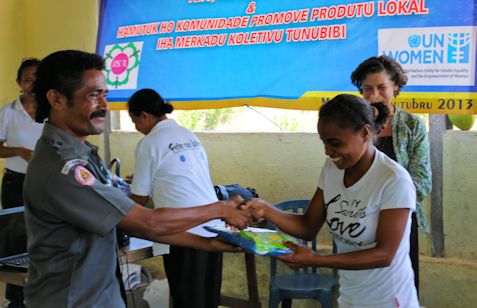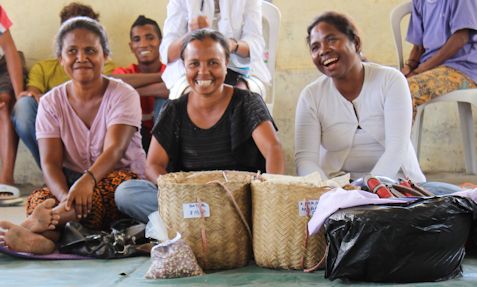More money, more decisions to be made
Date:
“We grow vegetables and make organic pesticides with natural materials we can find close to our village. The farmers that are using the organic pesticides say that they can see a difference in their crop growth after just one season. The grant that we are receiving today will help us make more pesticides and expand our garden so that we can eventually transport our goods to the main market to sell,” said Rosalina Moniz, survivor of domestic violence and leader of the Protection Holsa group. The group has been working since 2009 producing bricks, selling fresh and dried meat and is adding a community mediation component to their activities.

Self-help group member, Felicidade Dos Santos, receiving a grant from UN Women-APSC-TL in Maliana on 30 October 2013. Credit: UN Women/Betsy Davis
The multi-country Women, Peace and Security programme, initiated in 2007 and currently funded by the European Union (EU), the Department for International Development (DFID), and Australian Aid (AusAid), emphasizes not only the importance of women’s decision-making in peace building processes, but also strengthens community ties and economic foundations as a means of preventing violence against women and securing future stability. Self-help groups were given micro-grants in 2009 and four groups demonstrating incredible achievements received another grant today.
With locally produced goods set up throughout the community centre, self-help group members were in high spirits, and enjoyed showing local leaders the proof of their labor.
“Today, we are here to celebrate success. These women-led groups have found ways to work together, as women, men, and peace mediators, to increase economic opportunities,” said the Sub-District Administrator, Alipio Moniz, who spoke at the event organized by UN Women partner Asia Pacific Support Collective Timor-Leste (APSC-TL). A quiz on UN Security Council resolution 1325 about women’s part in peace building both during and after times of conflict was given to the self-help groups, with all four grant recipient groups competing against each other. Special attention during the quiz was paid to linking participation in these groups to women’s decision-making.
“Decision-making starts in the home, and builds out from there. If women are making decisions at home, this can be carried over to making decisions in their self-help groups about which crops to grow, or when to harvest. When women are supported in these decisions, they can then feel confident enough to run for political office and be a part of peace building at a higher level,” said Theresa de Langis, women, peace and security expert consultant for UN Women.

Development Tapo-Memo self-help group with their corn, beans and rice, all organic products grown in their area. Credit: UN Women/Betsy Davis
With only 2 women village leaders in this particular community, community members reflected on this point. “I joined the self-help group to be able to send my kids to school. This was a decision that I made to push our family ahead and to better the future of Timor-Leste, and my husband supported it. We are making more decisions in Patarata (a UN Women-supported self-help group), and if I become more active in my political party, maybe I will run for political office someday,” said Adriana Araujo Lopes, self-help group member since 2011. Araujo Lopes’ group grows vegetables, and has an 11-hectare plot of land that they are currently harvesting. When asked what the group will do with the grant money, Araujo Lopes said, “We have talked about it as a group, and we would like to start growing new types of vegetables and fruit. Many farmers grow the same things, so we want to do something different to be more competitive. And to earn more money! More money, more decisions to be made!”